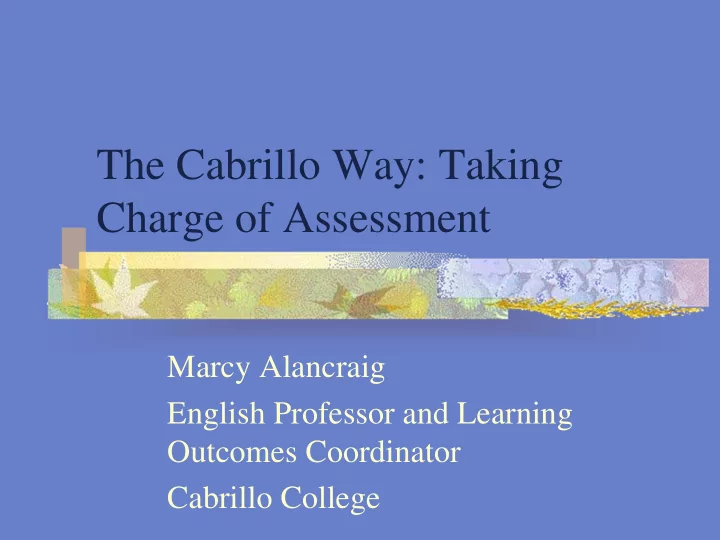

The Cabrillo Way: Taking Charge of Assessment Marcy Alancraig English Professor and Learning Outcomes Coordinator Cabrillo College
To Deal with Assessment You Need: � Sense of Play � Willingness to Experiment � Healthy Dose of Skepticism � Ability to translate assessment theory and jargon into the language of your college
Cabrillo’s Early Years � 1997-98 � Division Chairs studied assessment theory � Faculty Senate got into the act � 1999-2002 � Summer Institutes
Institutes � Focused on classroom assessment � Contract and adjunct faculty participated � Converted one class to an outcomes model � Dialoged about teaching � Discovered that SLO assessment can work!
New Accreditation Standards: The 5 Stages of Faculty Grief � Denial � Anger � Bargaining � Depression � Acceptance
Faculty Senate Said: Let’s Take Charge! � Designed Course and Institutional Assessment for Transfer and Basic Skills � Allowed Occupational Programs to design their own process � Tied both to Departmental Review Process
Cabrillo Guiding Principle � KISS method � Keep it simple, sweetheart!
Key Decisions � Course-embedded method � Does not require extra work from students or (mostly) faculty � Adjuncts and full-time faculty participate � To close the assessment loop, it is part of the Departmental Review process
More Key Decisions: Who Assesses What? � Occupational Programs – course, certificates and degree SLOs � GE and Basic Skills – course SLOs and College Core Competencies � Note: Transfer departments DO NOT define or assess departmental SLOs
College Core Competencies � Communication � Critical Thinking and Information Competency � Global Awareness � Personal Responsibility and Professional Development
Cabrillo’s Core 4 � SLOs for AA and AS degree � SLOs for General Education Program � SLOs for all campus departments, even those that only indirectly aid instruction
Final Key Decisions: Assessment � It’s possible to extrapolate the big picture from looking closely at the small � Faculty have the wherewithal to do this
Method: The Small Picture � Faculty choose 1 assignment in 1 class � Create rubric to measure it � Grade the assignment using rubric � Analyze the results: � How well are students achieving this outcome? What student needs and issues are revealed? � � Faculty member alters classroom teaching or assignment if necessary
Method: Bigger Picture � Assignment, rubric and results shared in a department meeting � Department analyzes: what are the student issues occurring across all courses? � How can they be addressed? � Results of discussion recorded on simple form � Analysis used as basis for funding requests in departmental review
Method: Biggest Picture � All department results forwarded to SLO Assessment Review Committee � Identifies campus trends, overall student issues and needs; writes yearly report � If necessary, initiates campus dialogue on a pressing issue or need � Archives everything for accreditation
Evidence for Accreditation � But where are the numbers? � Outcomes do not have to be numerical as long as everything is documented and the assessment loop is closed
Closing the Assessment Loop � Assessment must feed back into processes to improve teaching and learning � In the classroom � In the department � Across the entire campus • Activity should be useful and easy
Activity � Discuss assignments you might use to assess course or college SLOs � Bonus points for finding a way to close the assessment loop
Sample Assessments: Human Genetics � SLO: � Assessment: Analyze the effects Short Essay as part of genetics on of midterm and human final development and sex determination.
Sample Assessments: Photography � SLO: � Assessment: Produce photographic Portfolio of images, applying photographs basic concepts of visual organization and aesthetics, and personal expression.
Sample Assessments: English 1A � SLO: � Assessment Write essays, Research Paper including research- based writing, demonstrating academic rhetorical strategies and documentation
Activity � Using previous assignment, discuss what kind of rubric you would construct to grade it � Bonus points for actually starting to write one
Recommend
More recommend